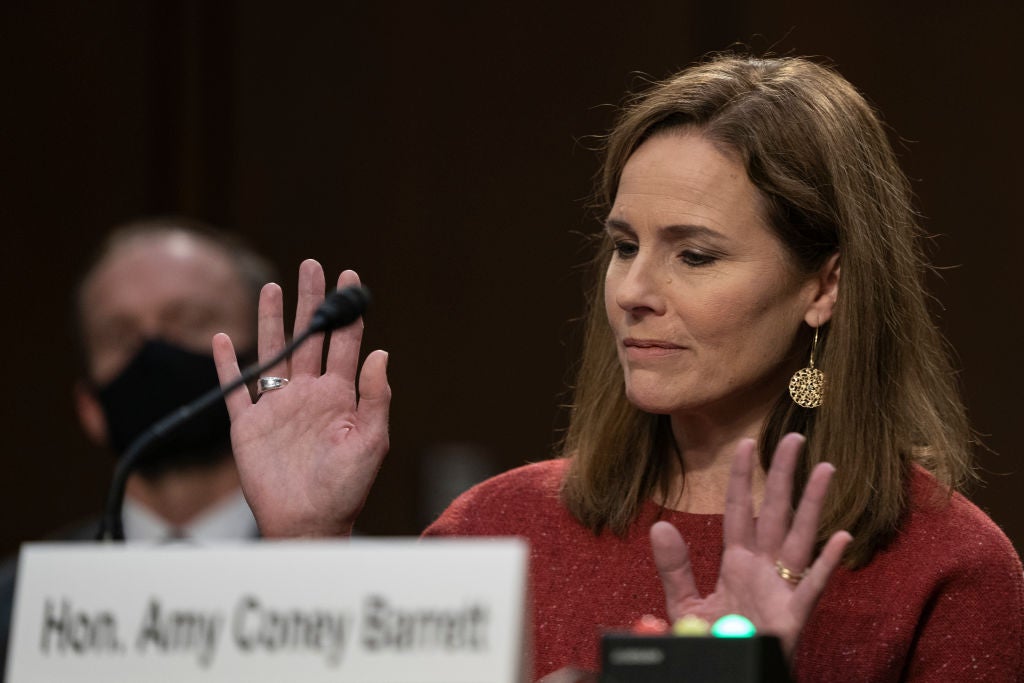The Independent's journalism is supported by our readers. When you purchase through links on our site, we may earn commission.
The questions Amy Coney Barrett wouldn't answer at her hearing are the red flags we worried about
The past three days underline how much America will be changed if Trump gets his way with SCOTUS


“A superspreader event.” That was how Dr Anthony Fauci, head of the National Institute of Allergy and Infectious Diseases, referred to the nominating event that preceded Senate confirmation hearings for judge Amy Coney Barrett, which have been going on for the past three days.
Aside from Trump, some of the more than twelve people who tested positive for Covid just days after the nomination at the White House included Sen. Mike Lee of Utah and John Jenkins, the president of the University of Notre Dame, where Barrett used to teach law.
Like most things during this administration, the hearings were a circus and the ignorance of the nation's elite was on full display for the world to see. Despite assurances from Senate Judiciary Chairman Lindsey Graham that everything could be done in person safely, Graham himself refused to get tested before walking into the proceedings. Sen. Lee, who was diagnosed less than two weeks ago, spoke on Monday and Tuesday without a mask in the closed room with no circulating air. Other senators and Judge Barrett spoke without a mask when it was their turn, meaning those physically present with them were subject to the unmasked speaker’s microscopic aerosolized spittle particles wafting around the room, exposing everyone to this dangerous and unpredictable airborne virus that has killed over 200,000 people in the US since March.
All this risky behavior so that Republicans could push through Barrett’s nomination before Trump is voted out of office on November 3rd, and before the Court is scheduled to vote on the Affordable Care Act that same month. A week after the presidential election, the US Supreme Court will hear arguments in California v. Texas and Texas v. California about the constitutionality of ACA’s requirement that almost all Americans acquire health insurance. If it’s found unconstitutional, then we will hear whether that clause is severable from the rest of the law, leaving the remaining legislation intact.
Speaking a specific language to a very specific audience, white Evangelical Republicans like Sen. Ted Cruz of Texas and Mike Lee of Utah prattled on about the importance of life and restrictions on abortion while demonizing ACA, not once stopping to acknowledge the Christian irony. They were, as Frederick Douglass would put it, the kind of "pathetic masters" that could will themselves to believe that "I shall hold my slaves and go to heaven too”.
For her part, Barrett was unflappable. She sat nearly motionless during the hearings but did go on the defensive to declare “I am not hostile to ACA” when asked tough questions about her views by Senators Dick Durbin (D-IL), Amy Klobuchar (D-MN), Patrick Leahy (D-VT) and Cory Booker (D-NJ). Democrats weren’t surprised when she invoked her duty to decline to comment on potential future litigation. They were even less surprised when she avoided answering Booker’s questions about whether she would recuse herself if Trump attempted to pardon himself from any past or future crimes. Similarly, Barrett avoided giving any meaningful answers to Sen. Diane Feldstein’s (D-CA) and Sen. Klobuchar’s questions about her views on abortion rights.
Feinstein and Klobuchar’s line of questioning was right on the mark; while the justice does not have to answer questions about how she might rule on potential future litigation, she certainly should have spoken about opinions she has endorsed in the past, judgements she has issued before, and whether she would recuse herself from any abortion-related litigation because of it. As early as 2006, Barrett signed her name in a newspaper advert that read: “We, the following citizens of Michiana, oppose abortion on demand and support the right to life from fertilization to natural death.” More recently in 2013, she signed an advertisement issued by Notre Dame University that was critical of abortion.
The audience was regularly reminded by Republicans that Barrett, like her mentor the late justice Antonin Scalia, was an “originalist” in terms of constitutional theory – as if that pardoned her endorsements of anti-abortion stances and favoritism of gun rights over voting rights as pointed out by Sen. Leahy on day two.
The originalist argument is an ironic distraction device. America’s founding fathers were slave-holders and revolutionaries. But it’s probably safe to say they’d be appalled to learn that over two hundred years later—amid advents of the internet, space travel, Germ Theory and Joseph Lister’s antisepsis system for surgery—that potential Supreme Court judges would be wasting the American public’s time by blathering on about the importance of interpreting the constitution in line with the thinking of those who wrote it in the 18thcentury, before African-American men and Native Americans people had citizenship rights and well before women could vote.
Unfortunately, as Lindsey Graham pointed out in his opening statement on day one, there would be few surprises during the hearings; Democrats will all vote “no” and the Republicans will vote “yes”. And he was right. Barrett will very likely be our ninth Supreme Court Justice and tip the scale to six conservative judges versus three progressive judges. All Americans can do now is exercise their right to vote and flip the Senate and the Executive, and help Democrats maintain control of the House of Representatives. Because despite her claims to not have an agenda, her record — or "tracks", as Klobuchar put it — speaks for itself. Indeed, with the impending confirmation of Barrett, the judicial branch is lost to progressives for decades to come.
Join our commenting forum
Join thought-provoking conversations, follow other Independent readers and see their replies
0Comments